What is a Tar and Chip Driveway?
A tar and chip driveway, also known as chip seal or chip and seal, is a cost-effective and popular alternative to traditional asphalt or concrete driveways. This type of driveway surface offers a rough and textured look, as it consists of a layer of liquid asphalt that is sprayed onto a gravel base and then covered with a layer of stone chips. The tar and chip process involves the application of hot asphalt emulsion, followed by the spreading of stone chips and compacting them into the surface. This combination creates a durable and weather-resistant driveway that provides excellent traction, especially in wet conditions. Tar and chip driveways are commonly used for residential streets, private roads, and parking lots, as well as an affordable option for homeowners looking to enhance the functionality and appearance of their driveways. Regular maintenance, such as filling in any loose chips, can help extend the lifespan of a tar and chip driveway.
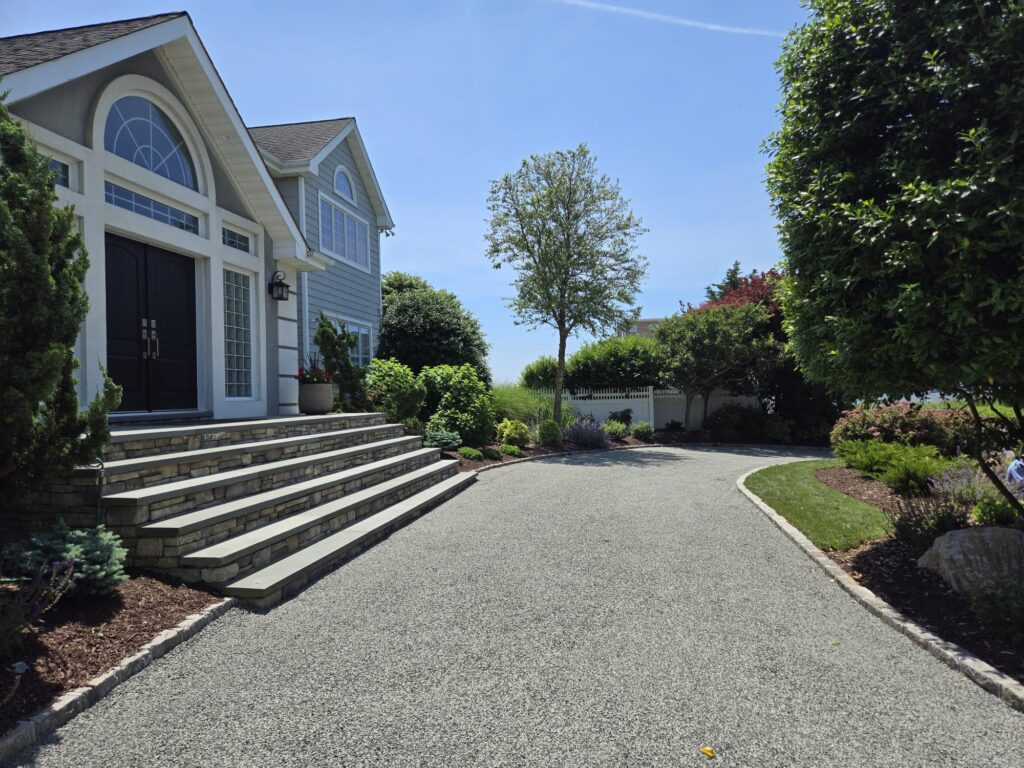
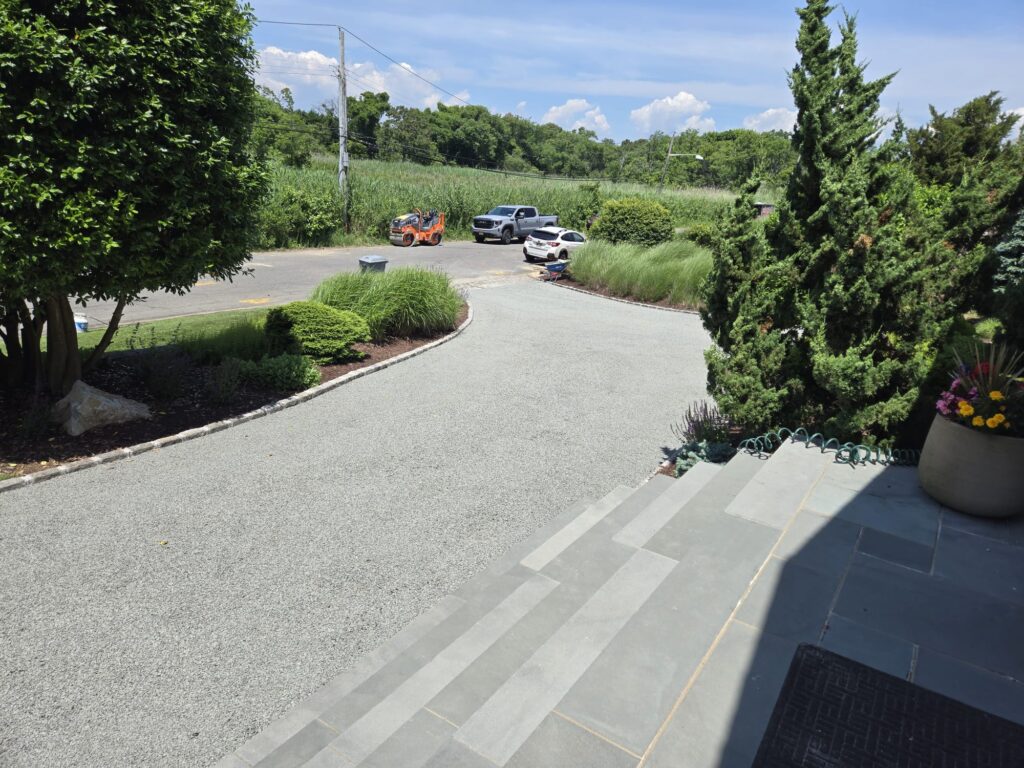
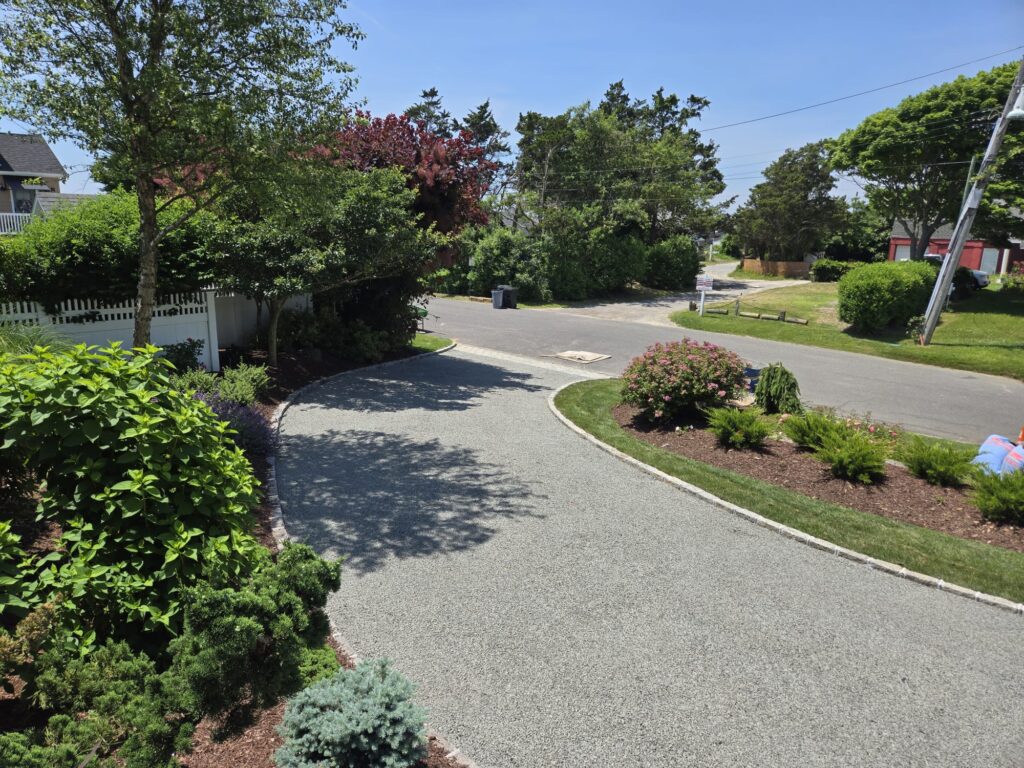
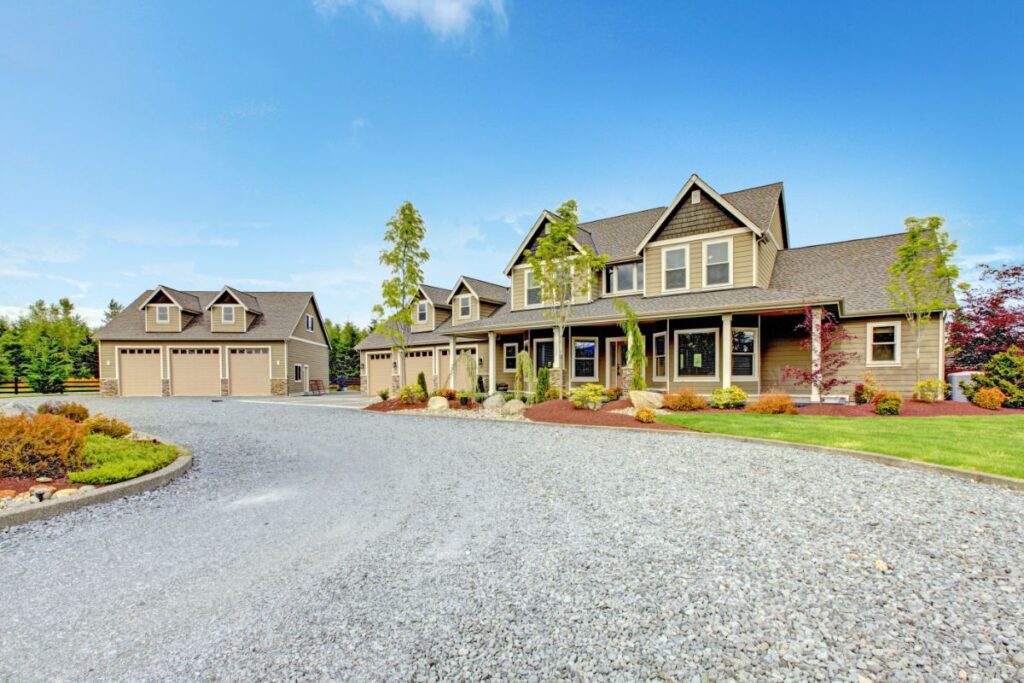




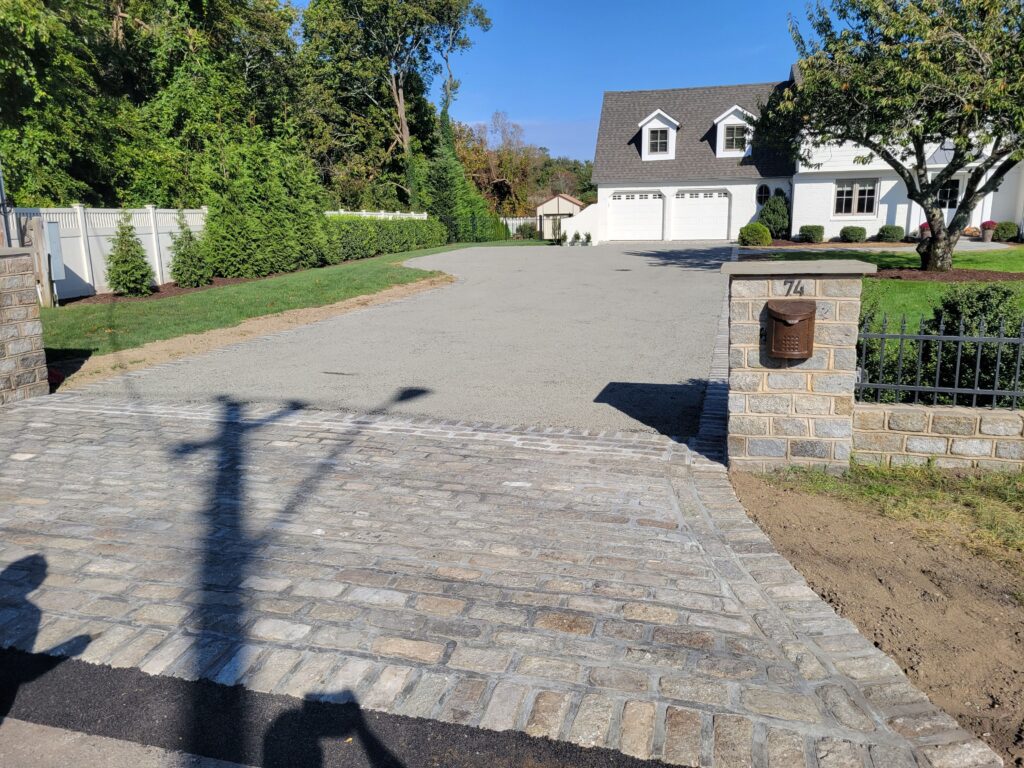
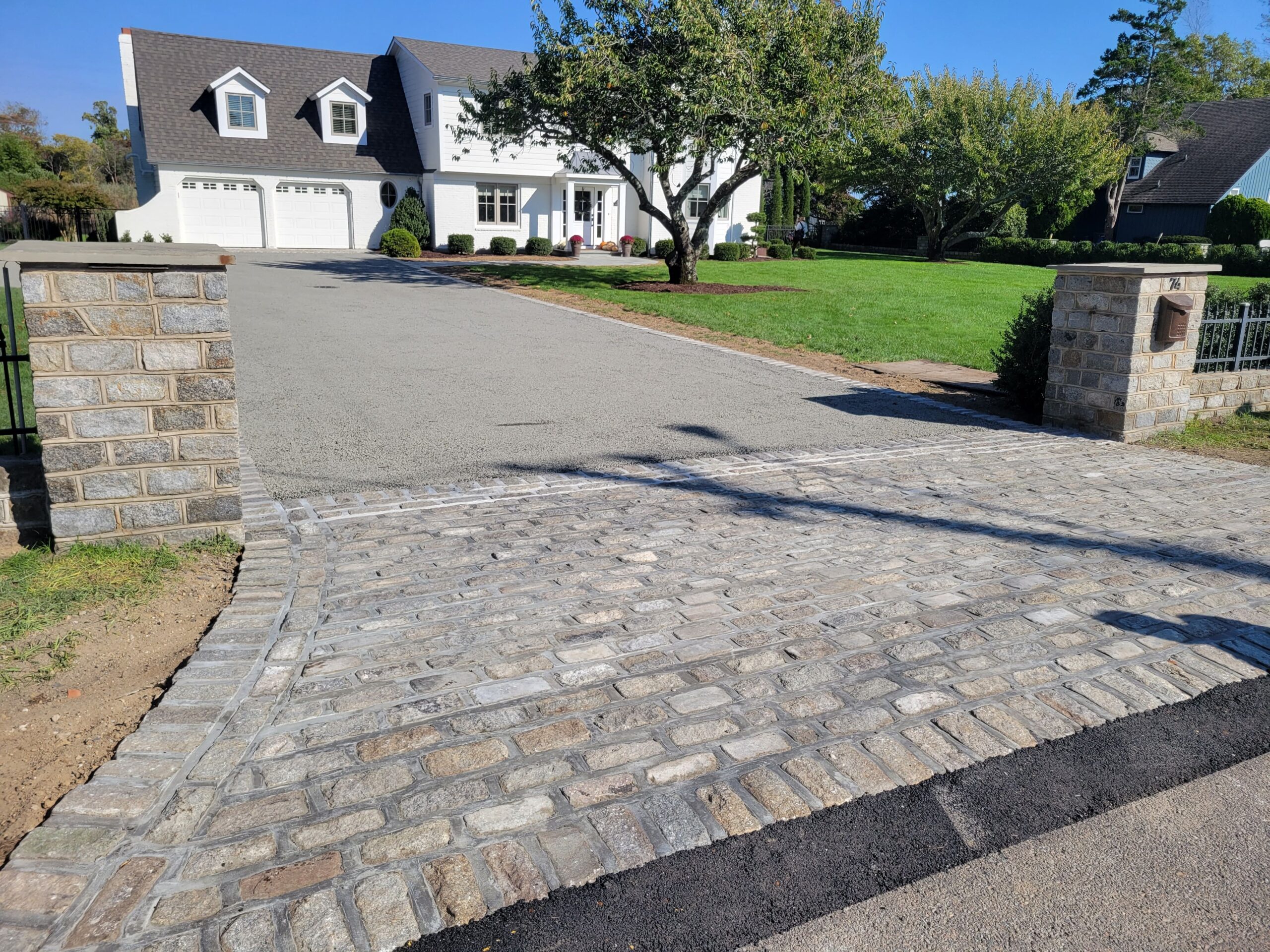
Benefits of a Tar and Chip Driveway
Tar and chip driveways are gaining popularity among Long Island, NY residents due to their numerous benefits. This cost-effective and low-maintenance option offers a durable surface that can withstand heavy traffic and harsh weather conditions.
One of the key advantages of a tar and chip driveway is its affordability. Compared to other paving options like asphalt or concrete, tar and chip driveways are considerably less expensive. This makes it an attractive choice for homeowners looking to save money on their driveway installation project.
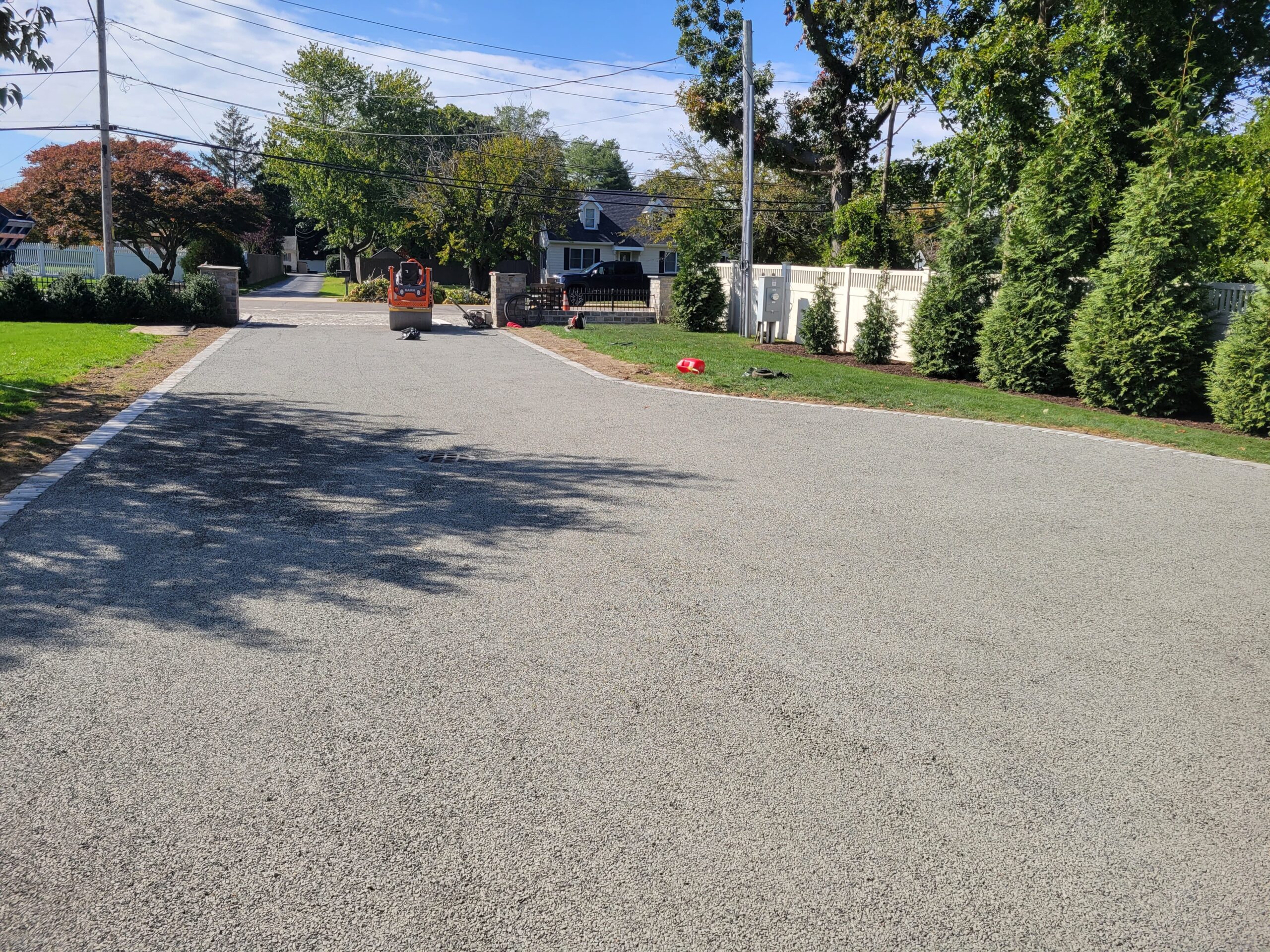
Contact Us Today And Save!
Additionally, tar and chip driveways require minimal maintenance. Regular sealing is not necessary, reducing the overall maintenance costs. This is especially beneficial for Long Island residents who experience varying weather conditions throughout the year.
Another advantage of a tar and chip driveway is the variety of colors and mixes available for customization. Homeowners can choose from a range of color options to match their aesthetic preferences. This customization allows them to create a unique and visually appealing driveway that complements the overall look of their property.
In terms of durability, tar and chip driveways are built to last. The application of a layer of liquid asphalt followed by a layer of gravel provides a strong and resilient surface. This ensures that the driveway can withstand heavy vehicles, such as trucks and SUVs, without showing signs of wear and tear.
Overall, a tar and chip driveway is a cost-effective, low-maintenance, and durable option for Long Island residents. With the variety of colors and mixes available, homeowners can have a beautiful and customized driveway that enhances the curb appeal of their property.
Installation Process
The installation process for a tar and chip driveway involves several steps to ensure a smooth and durable surface. First, the existing driveway or area is thoroughly cleaned and prepared. Any vegetation or debris is removed, and the surface is graded to ensure proper water drainage. Next, a layer of liquid asphalt is applied to the prepared surface. This sticky substance acts as a binding agent, helping the gravel adhere to the surface. After the liquid asphalt is applied, a layer of gravel or chip stones is spread evenly over the surface. The stones are then compacted into the asphalt using heavy machinery. This compaction process ensures that the stones are securely embedded in the asphalt, creating a strong and durable surface. Excess chips are then swept away, leaving a neat and clean finish. Overall, the installation process for a tar and chip driveway is relatively quick and can be completed in a matter of days, depending on the size of the project.
Tools and Materials Needed for Installation
When it comes to the installation of a tar and chip driveway, there are several tools and materials that are essential for the job. These include:
1. Gravel: A base layer of high-quality gravel is needed to create a stable foundation for the driveway.
2. Hot Liquid Asphalt: This is poured onto the prepped gravel base and acts as a binder for the stone chips.
3. Stone Chips: The desired stone chips are spread on top of the hot liquid asphalt to create the desired look and texture.
4. Asphalt Roller: This heavy-duty roller is used to compact and seal the stone chips into the liquid asphalt.
5. Asphalt Sprayer: This equipment is used to evenly distribute the hot liquid asphalt onto the gravel base.
6. Rakes and Shovels: These tools are used to spread and level the stone chips during the installation process.
It's important to note that accurate pricing for a tar and chip driveway installation can only be given after an on-site assessment. The cost breakdown generally includes the cost of materials, such as gravel, hot liquid asphalt, and stone chips, as well as the cost of labor. The total costs may also vary depending on the size of the project and any additional requirements, such as grading or drainage considerations. It is recommended to consult with a professional contractor to get an accurate estimate for your specific project.
Step-by-Step Guide to Installing a Tar and Chip Driveway
A tar and chip driveway is a popular choice for Long Island homeowners looking for an affordable and durable surface for their driveway. The installation process involves several steps to create a strong and visually appealing finish.
1. Gravel Base: The first step is to prepare the area by excavating the site and laying down a layer of high-quality gravel. This serves as the base layer and provides stability for the driveway.
2. Hot Liquid Asphalt: Once the gravel base is in place, hot liquid asphalt is poured onto it. This liquid asphalt acts as a binder, ensuring that the stones adhere to the base.
3. Stone Chips: After applying the hot liquid asphalt, the desired stone chips are spread evenly onto the surface. Homeowners have the option to choose different colors of stones to create a unique appearance for their driveway.
4. Compaction: To seal the stone chips into the liquid asphalt, a heavy-duty roller is used to compact the surface. This helps to create a smooth and durable finish.
5. Finishing Touches: Any excess or loose chips are removed from the driveway, and the surface is left to dry. This allows the stones to settle into the asphalt, creating a cohesive and aesthetically pleasing driveway.
By following this step-by-step guide, homeowners can enjoy a tar and chip driveway that not only offers an affordable option but also provides a visually appealing and long-lasting solution.
The Difference between Tar and Chip, Asphalt Paving, and Gravel Driveways
When it comes to driveway choices, tar and chip, asphalt paving, and gravel driveways are all popular options. Each of these driveway materials offers unique advantages and considerations for homeowners. Tar and chip driveways, also known as chip seal driveways, offer a durable surface that is cost-effective and requires regular maintenance. This type of driveway is created by applying hot liquid asphalt onto a gravel base, followed by the addition of stone chips that are compacted to create a rough surface. Asphalt paving, on the other hand, involves the use of hot asphalt emulsion that is poured onto a prepared surface and then spread and compacted. This results in a smooth and paved surface that is commonly used for both residential and commercial parking lots. Gravel driveways, on the other hand, consist of a plain gravel base and loose stones that provide a dry and affordable option. However, they may require more maintenance due to loose stones and a lack of a paved surface. By understanding the differences between tar and chip, asphalt paving, and gravel driveways, homeowners can make an informed decision about which option is best suited to their needs and preferences.
Tar and Chip vs. Asphalt Paving
Tar and chip paving, also known as chip sealing, is a cost-effective alternative to traditional asphalt paving. Unlike asphalt, which consists of a mixture of aggregates and liquid asphalt, tar and chip driveways are composed of a layer of liquid asphalt, followed by a layer of stone chips.
The installation process for tar and chip driveways involves applying a layer of liquid asphalt onto the prepared surface, and then immediately spreading a layer of stone chips over the top. The chips are rolled into the asphalt, creating a textured and durable surface.
While tar and chip driveways may not be as smooth as asphalt surfaces, they provide good traction and are resistant to cracking. This makes them a great choice for steep slopes or areas that experience heavy rainfall, as the rough surface helps prevent vehicles from sliding.
One advantage of tar and chip paving is its affordability. The average cost of tar and chip installation is lower than that of asphalt, making it an attractive option for homeowners on a budget. Additionally, tar and chip driveways require less maintenance than their asphalt counterparts. Regular maintenance, such as resealing, is not necessary for tar and chip surfaces.
However, one disadvantage of tar and chip paving is the loose stones that can occasionally become dislodged from the surface. This can create a slightly rougher driving experience. Additionally, tar and chip driveways may not be suitable for high traffic areas or extremely heavy vehicles, as they are not as durable as asphalt surfaces.
Overall, tar and chip driveways provide a durable and cost-effective solution for homeowners looking for a rough but long-lasting surface. Consider choosing tar and chip if you have a limited budget, require good traction on steep slopes, or want to avoid the regular maintenance associated with asphalt paving.
Tar and Chip vs. Gravel Driveways
Tar and chip driveways and gravel driveways are two popular options for homeowners looking for a durable and affordable driveway surface. While both provide a natural and rustic look, there are key differences in the materials used, installation process, and appearance.
Tar and chip driveways consist of multiple layers of hot asphalt that are overlaid with loose stones. During the installation process, a layer of liquid asphalt is applied to the prepared surface, followed immediately by a layer of stone chips. The chips are then rolled into the asphalt, creating a compressed and smooth surface. The result is a driveway that combines the durability of asphalt with the textured appearance of loose stones.
On the other hand, gravel driveways are made solely of loose stones, without any asphalt binding. Gravel is poured onto the prepared surface and compacted to create a stable driveway. Gravel driveways have a more natural and rugged appearance, as the stones are not bound together like they are in tar and chip driveways.
In terms of appearance, tar and chip driveways offer a cohesive and polished look, with the stones embedded in the asphalt. Gravel driveways, on the other hand, have a looser and more scattered appearance, with the stones visible and able to shift over time.
Overall, tar and chip driveways provide a smoother and more durable surface compared to gravel driveways. However, gravel driveways have the advantage of lower installation costs and a more natural look. The choice between the two depends on individual preferences, budget, and the desired aesthetic for the driveway.
Hot Asphalt vs. Liquid Asphalt in Tar and Chip Installations
In tar and chip driveway installations, both hot asphalt and liquid asphalt are essential components that play different roles in creating a durable and visually appealing surface.
Hot asphalt is a mixture of aggregates, sand, and bitumen that is heated and then applied as a base layer in the tar and chip installation process. It provides a strong and stable foundation for the driveway, ensuring a long-lasting and robust surface. Hot asphalt also helps to bind the loose stones together, preventing them from shifting or becoming dislodged over time.
On the other hand, liquid asphalt, also known as asphalt emulsion, is a binding agent that is sprayed onto the hot asphalt layer. It serves as a tack coat, helping to hold the stone chips in place and creating a secure and cohesive surface. Liquid asphalt also enhances the adhesion between the layers, improving the overall strength and durability of the driveway.
When it comes to advantages, hot asphalt provides excellent stability and durability, making it suitable for areas with heavy vehicle traffic such as parking lots and residential streets. Liquid asphalt helps to create a smooth and seamless surface, minimizing the risk of loose stones creating a hazard.
However, it is worth considering the disadvantages as well. Hot asphalt can be more expensive than other paving options, making it less cost-effective for larger areas. Liquid asphalt requires proper application, as uneven spraying can result in areas that are prone to cracking or water infiltration.
In summary, hot asphalt and liquid asphalt are both crucial components in tar and chip driveway installations. While hot asphalt provides stability and durability, liquid asphalt ensures a cohesive and visually appealing finish. Understanding the advantages and disadvantages of each material can help homeowners make an informed choice when considering tar and chip installations.
Maintenance Requirements for a Tar &Chip Driveway
Maintenance Requirements for a Tar & Chip Driveway
Installing a tar and chip driveway provides a durable and cost-effective option for homeowners. While tar and chip driveways require less maintenance compared to traditional asphalt or concrete driveways, regular upkeep is still necessary to ensure its longevity. Here are some maintenance requirements to keep in mind:
1. Regular Sweeping: Sweeping the surface of your tar and chip driveway regularly helps to remove loose stones and debris. This prevents them from becoming dislodged and causing damage to vehicles or the driveway itself.
2. Sealing with Chip Seal: Periodically applying a new layer of chip seal helps to restore the appearance and durability of your tar and chip driveway. This process involves spraying a layer of liquid asphalt onto the existing surface and then spreading a new layer of stone chips over it. This helps to fill in any gaps or cracks and provides a fresh protective layer.
3. Filling Cracks: Over time, small cracks may develop on the surface of your tar and chip driveway. These should be promptly filled with a specialized crack filler to prevent them from expanding and causing further damage.
4. Avoid Heavy Machinery: To maintain the integrity of your tar and chip driveway, it is best to avoid heavy machinery or equipment from driving or parking on it. This can prevent excessive wear and tear and prolong the lifespan of the driveway.
By following these maintenance requirements, you can ensure that your tar and chip driveway remains in excellent condition and continues to provide a durable and attractive surface for your property.
Regular Maintenance Tips for Extending the Life of Your Tar & Chip Driveway
Regular maintenance is crucial for extending the life of your Tar & Chip Driveway. Here are some key tips to keep in mind:
1. Sweepers and Water: Regularly sweep your driveway to remove loose chips, sand, and other debris. This helps prevent them from causing damage and maintains a clean appearance. Additionally, using water to clean the surface can remove any residual dirt or dust.
2. Repetitive Application of Seal Coat: Applying a seal coat every few years is important to preserve the longevity of your Tar & Chip Driveway. This process involves spraying a liquid asphalt emulsion on the surface and then spreading a fresh layer of stone chips. This helps protect against weather, UV rays, and fading, while also sealing in the existing chips.
3. Annual Service: It is recommended to schedule an annual service for your Tar & Chip Driveway. This includes inspecting for any cracks or damage and promptly repairing them. Additionally, reapplying seal coat as needed and addressing any drainage issues to prevent water damage.
By following these regular maintenance tips, you can ensure that your Tar & Chip Driveway remains in peak condition, providing a durable and attractive surface for years to come.
Cost Considerations for Installing a Tar & Chip Driveway
When considering installing a tar and chip driveway, cost is an important factor to take into account. While tar and chip driveways offer a more affordable option compared to asphalt or concrete, it's still important to understand the cost considerations involved in the installation process. The average cost of a tar and chip driveway can vary depending on factors such as the size of the project, the local labor rates, and the type of materials used. Generally, the cost is calculated per square foot, which includes the cost of materials, labor, and equipment. It's also important to note that regular maintenance and upkeep of the driveway will incur additional costs over time. However, the long-term durability and aesthetic appeal of a tar and chip driveway make it a cost-effective choice for many homeowners. By considering these cost factors upfront and properly maintaining the driveway, homeowners can enjoy a durable and attractive surface for years to come.
Prices Vary Based Upon Design, Existing Conditions and Timeframe
When it comes to tar and chip driveway installation services, the prices can vary based upon the design, existing conditions, and timeframe. Several factors can influence the overall cost of the project.
Firstly, the size of the area to be paved plays a significant role in determining the price. Larger areas require more labor and material, leading to higher costs. Additionally, the desired thickness of the chip layer affects the overall price. Thicker layers may require more materials, increasing the cost.
Furthermore, any necessary repairs or preparations needed before the installation can impact the pricing. If the existing conditions are not suitable for paving, additional work may be required, adding to the overall cost.
Labor and material costs, location, and market demand are other variables that can influence the pricing. Labor costs can vary depending on the expertise and experience of the contractor. Material prices can fluctuate based on market conditions.
Lastly, the timeframe for the installation can affect the pricing as well. If there are specific deadlines or time constraints, it may require additional resources and expedited work, resulting in higher costs.
In conclusion, the prices for tar and chip driveways can vary based upon the design, existing conditions, and timeframe. Factors such as the size of the area, desired thickness of the chip layer, necessary repairs or preparations, labor and material costs, location, and market demand all play a role in determining the overall cost.
All Seasons Paving & Masonry Are Expert Tar and Chip Installers
All Seasons Paving & Masonry is a renowned company specializing in tar and chip driveway installation services. With years of experience and expertise, they have established themselves as experts in the field. Offering top-notch services, they cater to both residential and commercial clients. Their team of skilled professionals ensures a seamless installation process, delivering durable and high-quality tar and chip driveways. With a focus on customer satisfaction, All Seasons Paving & Masonry uses top-of-the-line materials and implements industry-best practices to create smooth and long-lasting surfaces. Their competitive pricing, attention to detail, and commitment to delivering exceptional results make them the go-to choice for tar and chip driveway installation. Whether you are looking to pave a small driveway or a large parking lot, All Seasons Paving & Masonry has the knowledge and experience to meet your needs. Contact them today for an affordable tar and chip driveway solution that combines affordability and durability.
Get A Free Quote Today
If you are considering a Tar and Chip Driveway installation for your property, getting a free quote is the first step towards making your vision a reality. All Seasons Paving & Masonry, a leading provider of quality paving services, offers free quotes to potential customers.
Obtaining a quote is quick and easy. Simply visit the All Seasons Paving & Masonry website or give them a call to request your free quote. On their website, you will find a form that you can fill out with your name, contact information, and details about your project. Alternatively, you can directly reach out to them via phone and provide the necessary information to get your quote.
To ensure an accurate quote, be sure to include as much detail as possible about your Tar and Chip Driveway project. This includes the desired dimensions of your driveway, any specific requirements or preferences, and any additional services you may need.
By providing All Seasons Paving & Masonry with the necessary information, you can expect a prompt response with a free quote tailored to your project. Don't hesitate to get in touch with them today to get started on your Tar and Chip Driveway installation.

